Are Electric Cars Bad for the Environment?
Is It Really Eco Friendly?
August 6, 2019 | Kathryn Kellogg
Last Updated on January 23, 2024
I have been a very vocal proponent of electric cars. I’m all ABOUT that energy transition from fossil fuels to renewable energy, so I’m often surprised by the blowback I receive when I talk about EVs.
I think that’s because there’s A LOT of misinformation going around.
And, where is a lot of this misinformation coming from? *cough cough* Oil companies *cough cough*
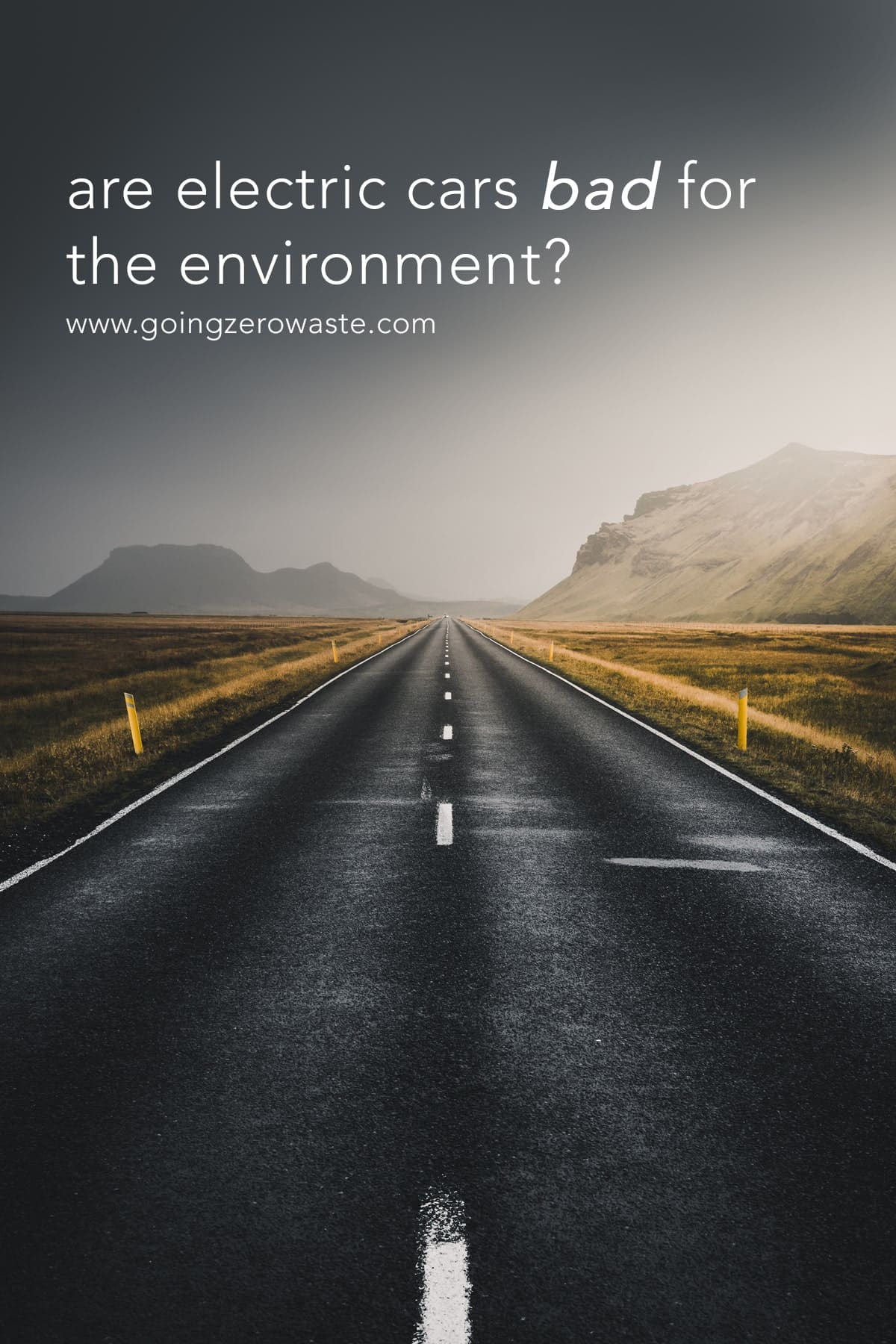
Before we dive into this blog post, I want to address two things upfront.
1. “EVs aren’t perfect!” You are correct, and I’m not saying they are.
2. You shouldn’t be advocating for ANY personal vehicles You should only promote public transportation!
If we lived in a world with amazing, safe, and easily accessible public transit – by all means YES! But we don’t.
I absolutely advocate for a world full of public transit.
I 100% support legislation to make that become a reality, but that doesn’t change the fact I’m still very PRO electric vehicles.
I’m from Arkansas. Where I grew up, the closest thing to me was a gas station five miles away.
Our cities weren’t designed for public transit, they were designed for cars.
And, we can argue how unfair that is until we’re blue in the face, but the fact is, until efficient public transit is available, people are going to be using cars and I would much rather those be EVs than gas guzzlers.
So, let’s bust some myths!
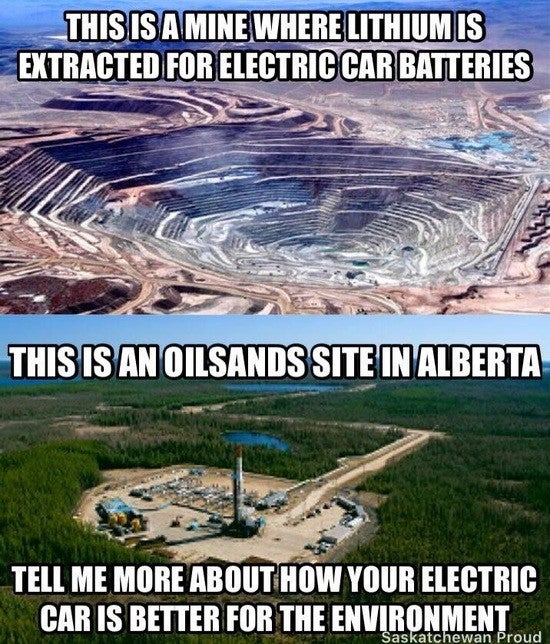
Table of Contents
lithium mining is destroying the planet:
You might have seen the photo above circling the internet.
The top half is supposedly a lithium mine, but that photo is actually a copper mine.
The bottom half of the picture is leaving out a few details like the fact wells are being drilled under the surface 400 feet deep.
And, how often do you hear people talk about the environmental impact of copper?
Probably, not very often.
There are four different types of mining: underground, open surface/pit (what we refer to as strip-mining), placer, and in-situ mining.
Strip mining is one of the most destructive types of mines. The copper mine featured above is a perfect example!
“The mines destroy landscapes, forests and wildlife habitats at the site of the mine when trees, plants, and topsoil are cleared from the mining area.
“This, in turn, leads to soil erosion and destruction of agricultural land.
“When rain washes the loosened top soil into streams, sediments pollute waterways.” (source)
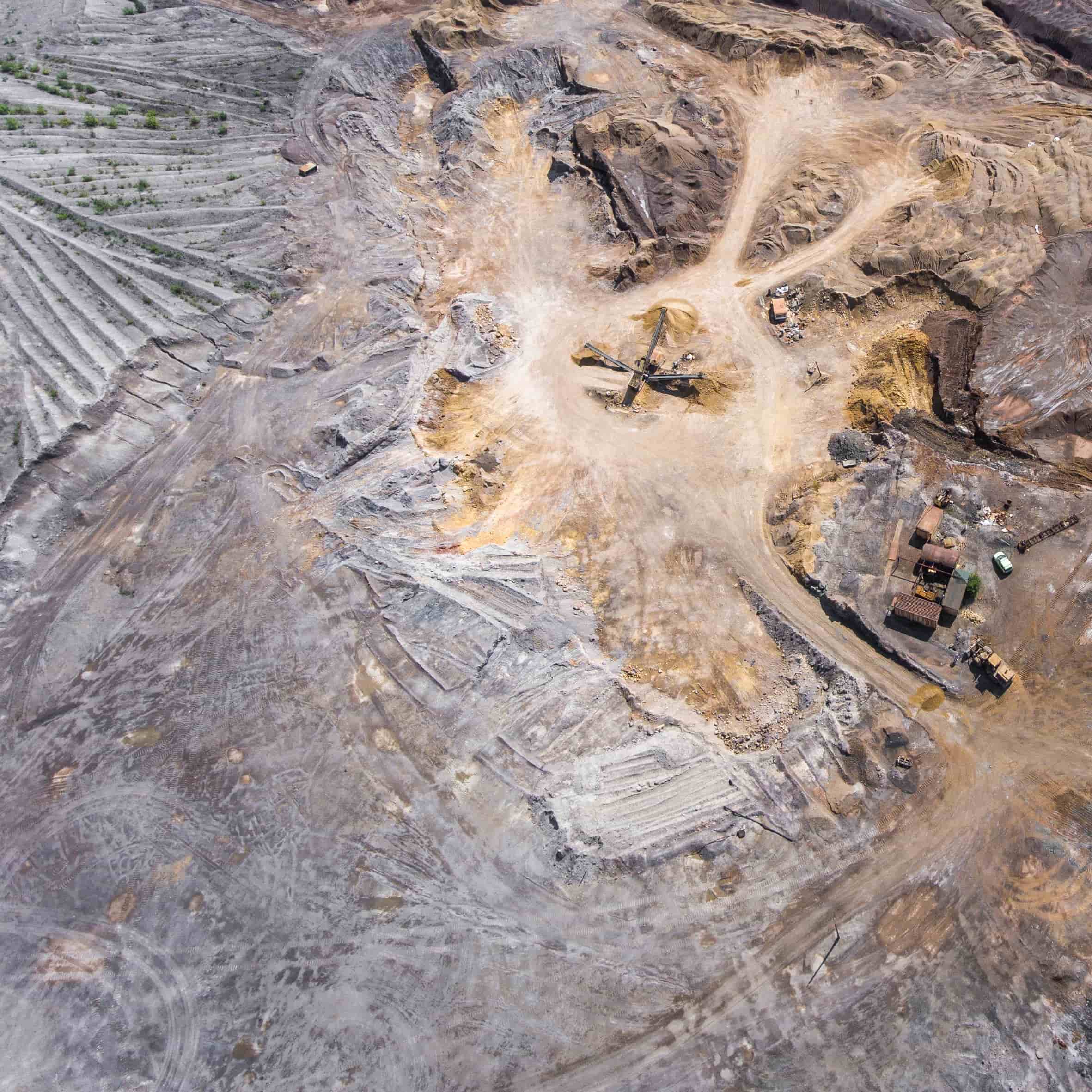
Metals and elements like aluminum, steel, gold, zinc, copper, lead, etc. etc are mined.
So, why do people like me often endorse products containing metals like stainless steel tiffins and aluminum cans over plastic water bottles?
Because metals are infinitely recyclable without any loss of quality. Metals are also valuable, so many of the products we buy contain recycled material.
You might notice, lithium didn’t even make the list.
Most lithium isn’t actually mined, sure, there are some hard rock deposits of lithium, but the majority of lithium comes from brine.
Lithium is obtained from salty lakes and is recovered using natural evaporation.
Workers will use pans to sift the lithium and then let the water evaporate which also leaves behind magnesium, calcium, sodium, and potassium.
Lithium is not only used in car batteries it’s also used for laptops, cellphones, air crafts, ceramics, glass, medicine, etc. etc.
Basically lithium has a lot of uses beyond just electric cars, and the very vocal opponents of lithium only have ONE problem against it… when it comes to electric vehicles.
So, maybe we should consider the smear campaign on lithium is just…. a smear campaign?
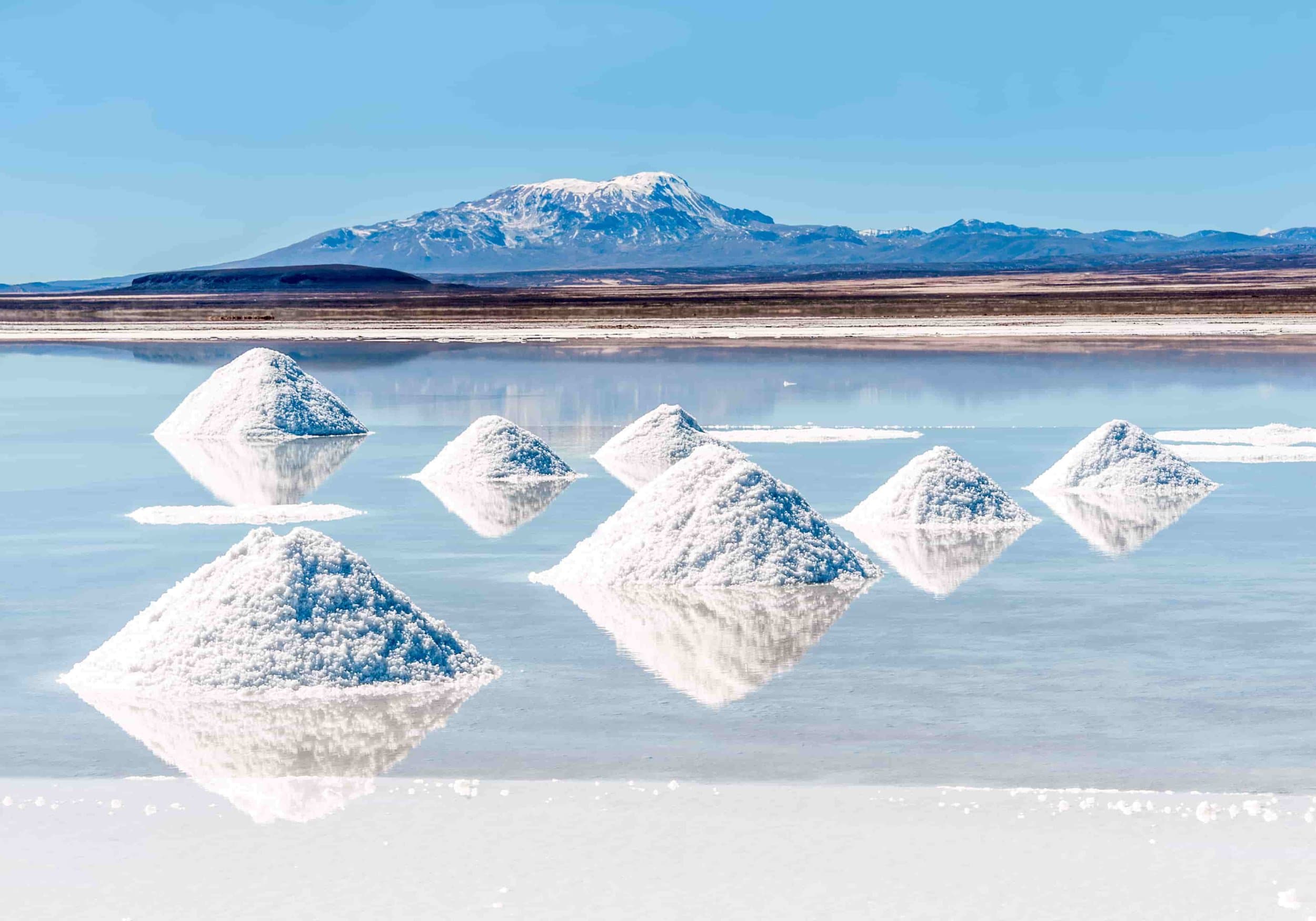
Lithium deposits being harvested from the lake
cobalt is ruining my day:
Cobalt has been called the “blood diamonds of batteries.” Cobalt, like the other metals mentioned earlier are strip mined, but the real tragedy of cobalt is the human rights violations that often come along with it.
There’s a long history of child mining, associated with production of cobalt in the Democratic Republic of the Congo.
This is horrible, but electric cars are not the only technology using cobalt.
Your computer, phone, tablet, etc. all of it uses cobalt. We should absolutely be outraged by these tragedies, but why do people only seem to be outraged when it comes to electric cars?
I’m not trying to make excuses, but this is one of my pet peeves. You can absolutely be outraged by cobalt, but be outraged by ALL cobalt, not just when it fits into your narrative.
All that being said, great strides are being taken to remove cobalt from all of our devices! In the Tesla 3, less than 3% of the lithium ion battery was made using cobalt, with a goal of removing cobalt altogether within the next year.
Panasonic one of the largest makers of lithium-ion batteries said they’re developing batteries that don’t need cobalt at all with many manufacturers following suit.
“Companies like Apple and Samsung have joined the Responsible Cobalt Initiative, pledging to address the worst environmental and social consequences of the supply chain.
And lately, Apple has started buying cobalt directly from miners to make sure the suppliers reach their workplace standards.” (source)
So, hopefully you can feel a little better about industry trends working to remove cobalt.
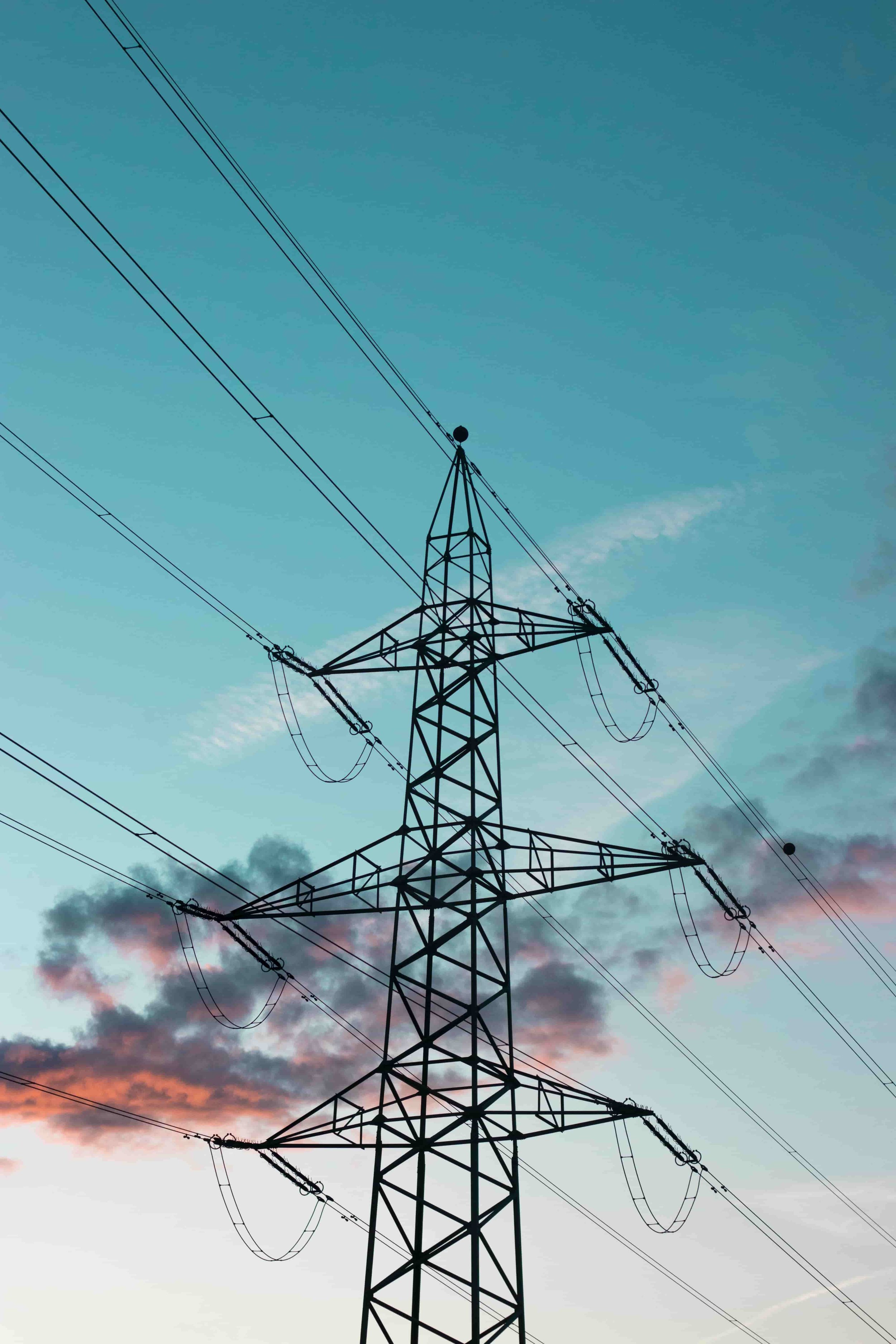
my cities grid isn’t powered by renewables:
The IVL Swedish Environmental Research Institute study is often cited when trying to prove that EVs are just as bad for the environment as diesel vehicles.
Want to take a guess as to who’s pushing these studies?
If you said the Koch Brothers, you would be correct! You can read more about that here and a dismantling of the study here.
Ideally, we’d all be charging our electric cars with our solar powered homes with our solar powered batteries, but that’s just not a reality for most of us.
I rent and have no place to charge an electric car or install solar panels.
Of course, there are still a lot of things I can do to lower my footprint, check out my blog post on 8 Ways to Lower Your Footprint at Your Apartment.
So, is buying an electric vehicle worse if you’re still going to be using non-renewable energy from the city grid to charge it? Nope, and for a few reasons.
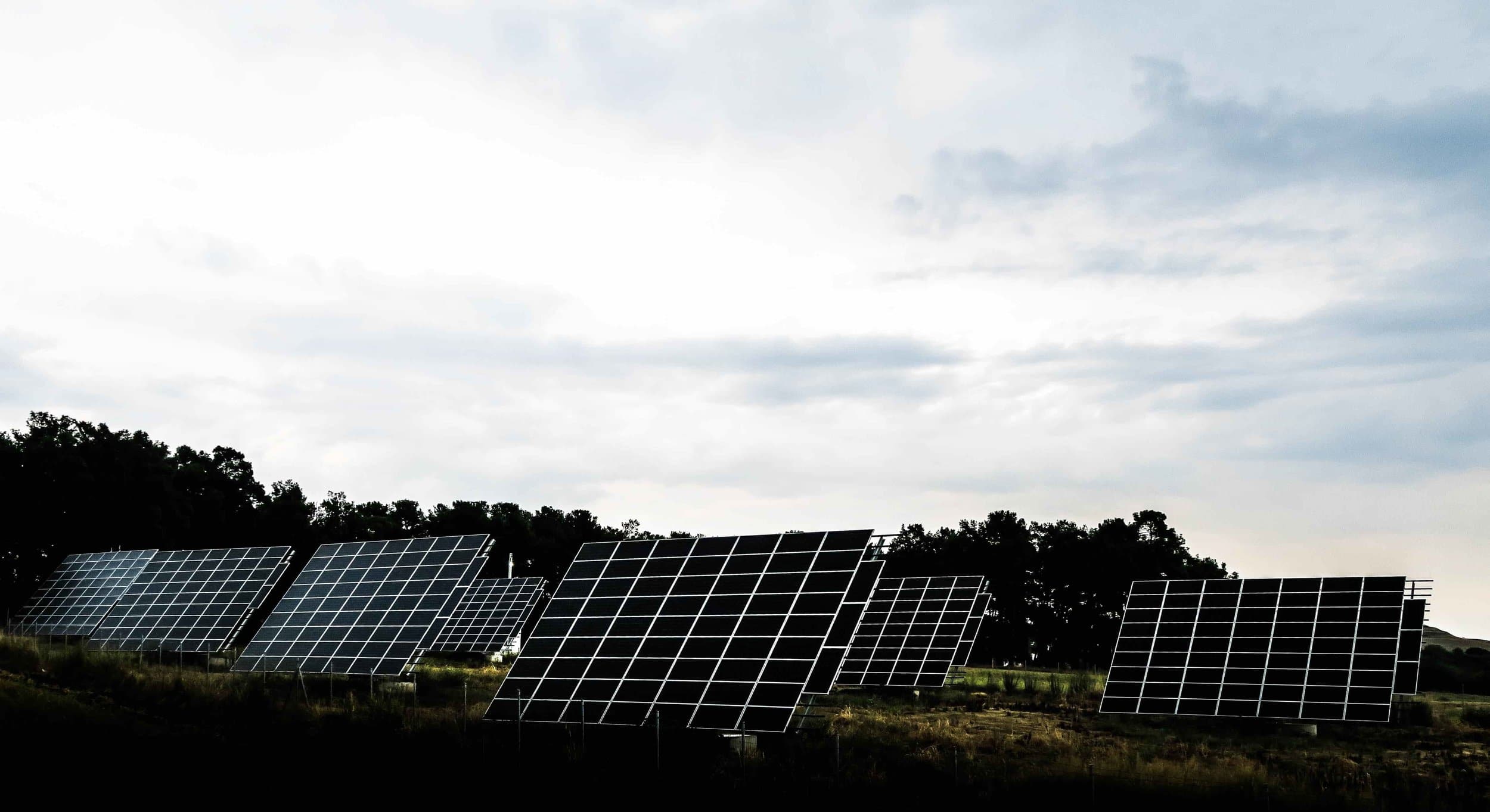
1. the energy transition is happening rapidly!
This is one thing that just makes me super excited!
We’re seeing many, many cities, states, and countries declaring climate emergencies and pledging 100% renewable energy by 2020, 2030, 2040, and even carbon neutrality by 2050.
The capacity for renewable energy is almost unlimited.
Insurance companies are refusing to insure dirty energy and utility companies that use more 30% coal.
Banks, investors and pensions are also being divested from dirty energy and it’s only a matter of time before the bulk of all energy is made up from renewables.
Solar and wind energy is also the cheapest!
In fact, it is actually more expensive to maintain an existing coal mine than it is to build a new solar farm.
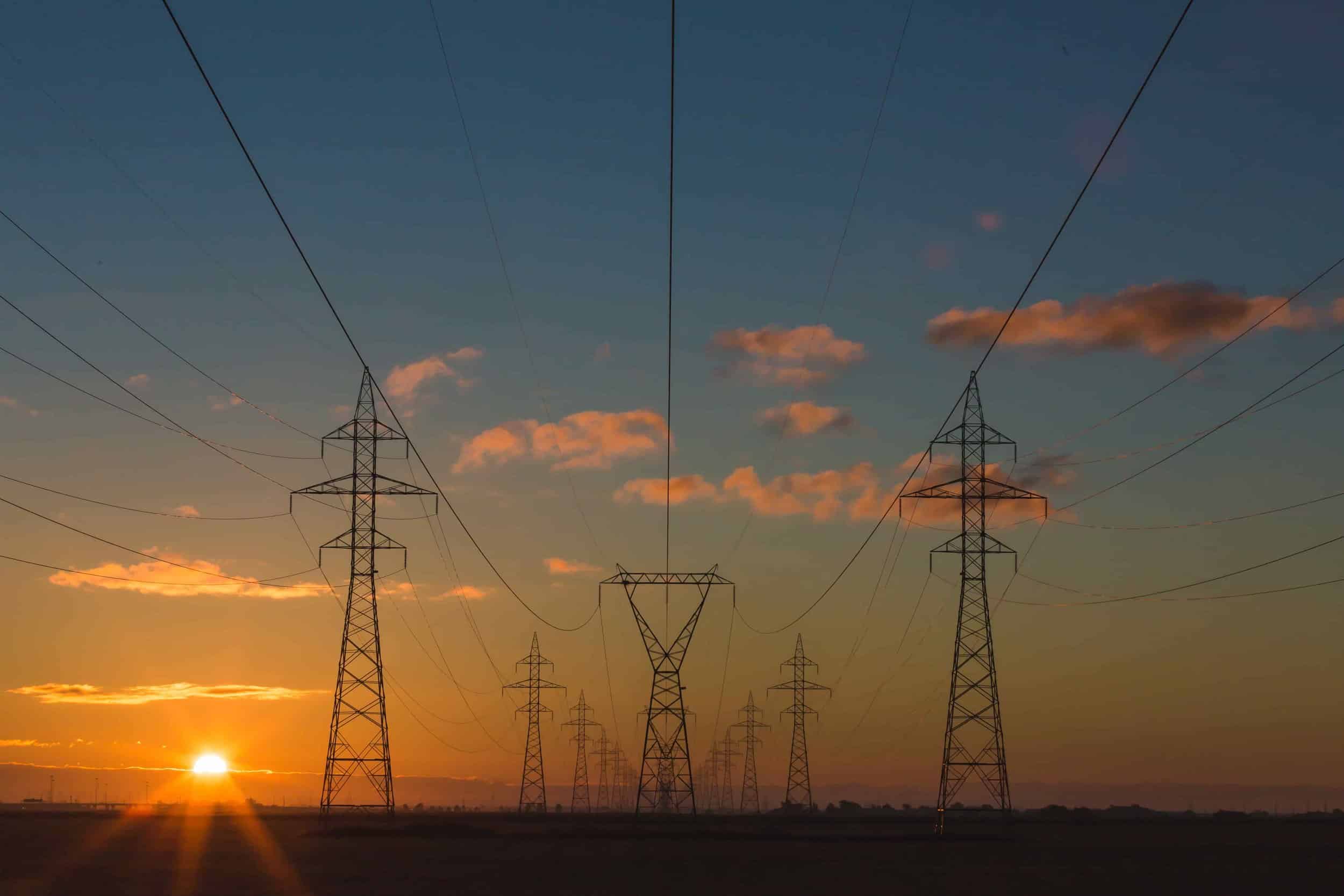
2. EVs are way more efficient.
Even if your city is using a lot of dirty energy, EVs are MUCH more efficient than gasoline powered vehicles.
So, even if you EV is charged with coal, the overall net emissions will be lower because the EV motors are more efficient.
Brian Feldman, a robotics expert has got some math for you math wizards.
“Consider the Tesla Model S, which has an available 85 kWh battery and a 265 mile range.
“Consider a similar gas-powered car, which gets 35 mpg. Gasoline contains about 33 kWh of energy per gallon. The Tesla uses 320 Wh/mile of energy (85 kWh/265 miles).
“The gas powered car uses 940 Wh/mile of energy (33 kWh/35 miles).
“Once the energy is on board (not counting the efficiency of the power generation, oil refining, or charging), the Tesla is using only about a third as much energy as the comparable gasoline-powered car.”
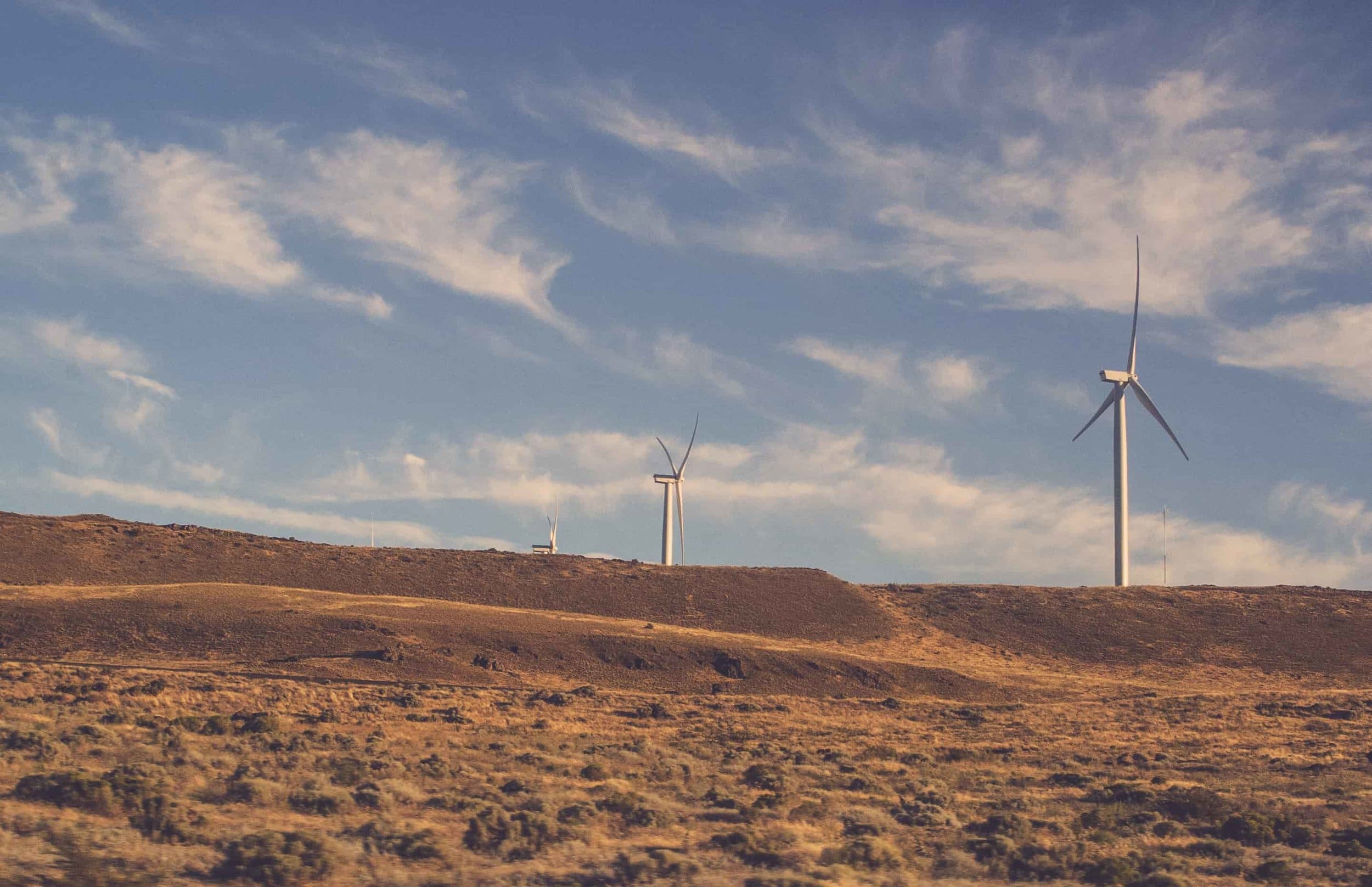
battery disposal:
Most of the batteries used in electric cars are not only recyclable but reusable!
If we’re looking at older technology the lead-acid batteries, 96% of the materials can be recovered.
Before we even get to recycling, the batteries can be recharged and reused.
When it comes to lithium-ion batteries, things get even better.
Once they’re no longer holding their original charge in the vehicle they still have a lot of storage.
These older or secondhand batteries are used to aid the grid! The batteries are used to store power to maintain renewable energy sources.
How cool is that!?
And, once it’s finally, finally time to recycle them most all of the components can be reclaimed.
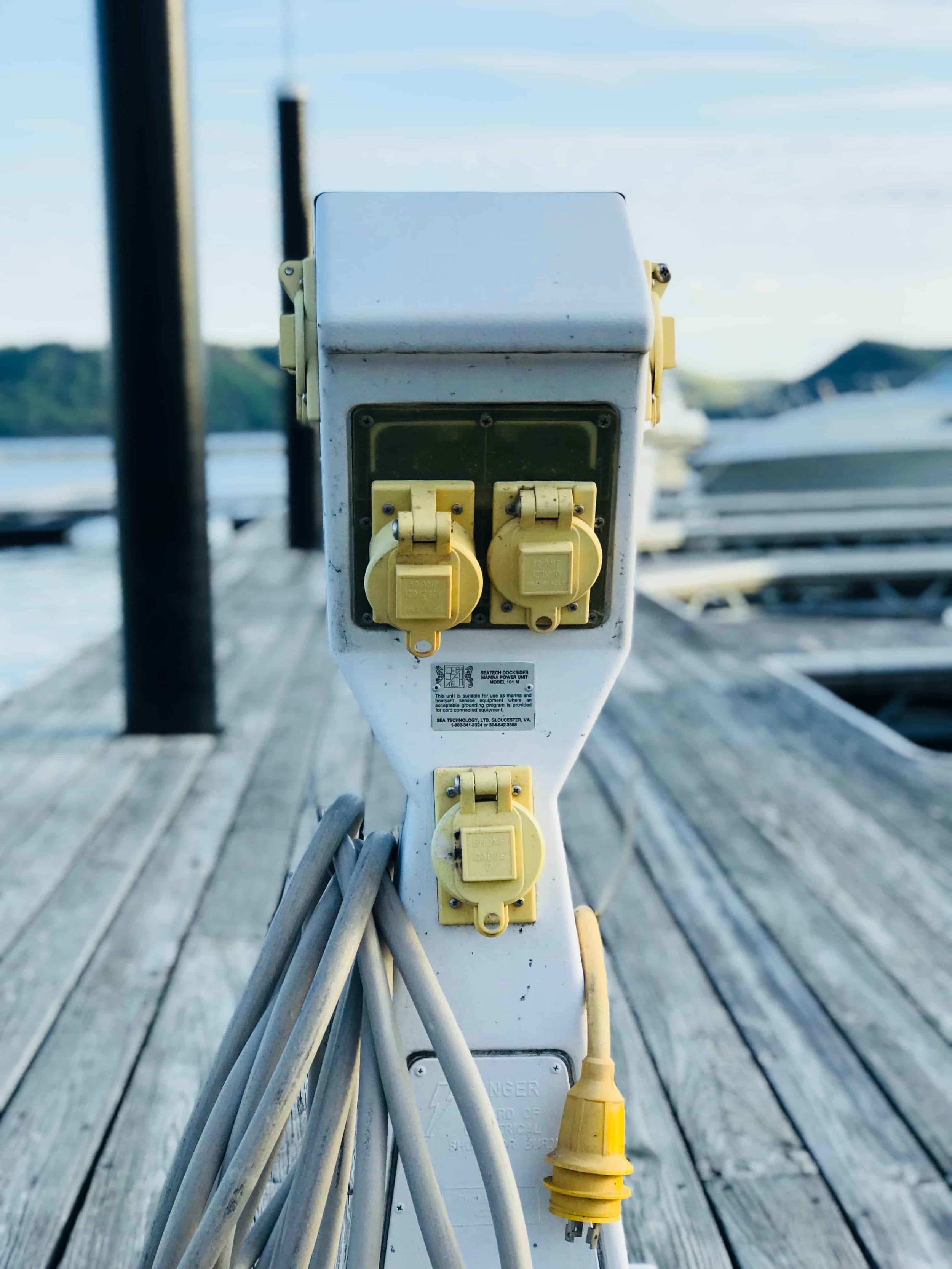
what about secondhand?
I think, if you can find a secondhand hybrid or EV, that’s awesome!
I also think buying a firsthand electric car is great too.
Why? Because it’s important to show demand in the market.
It’s the same reason why I shop secondhand but also buy from sustainable and ethical designers. I want to support progress in the industry.
Do whatever works for you and know that you’re making a good choice.
but you drive a honda!
Yep – totally do. I have a 13 yr. old Honda that I don’t plan on selling or upgrading anytime soon.
I get gas maybe, maybe once a month.
I don’t drive very often and take public transit as much as possible.
I’ve had my car for so long, that I don’t see any reason to get rid of it or to “upgrade”.
When the time comes for me to get a new car, you can bet I will be getting an electric! I’m pro firsthand and secondhand.
I’m pro both plug-ins and hydrogen fuel cell vehicles. I’m not super picky, I just want to lessen my dependence on the fossil fuel industry.
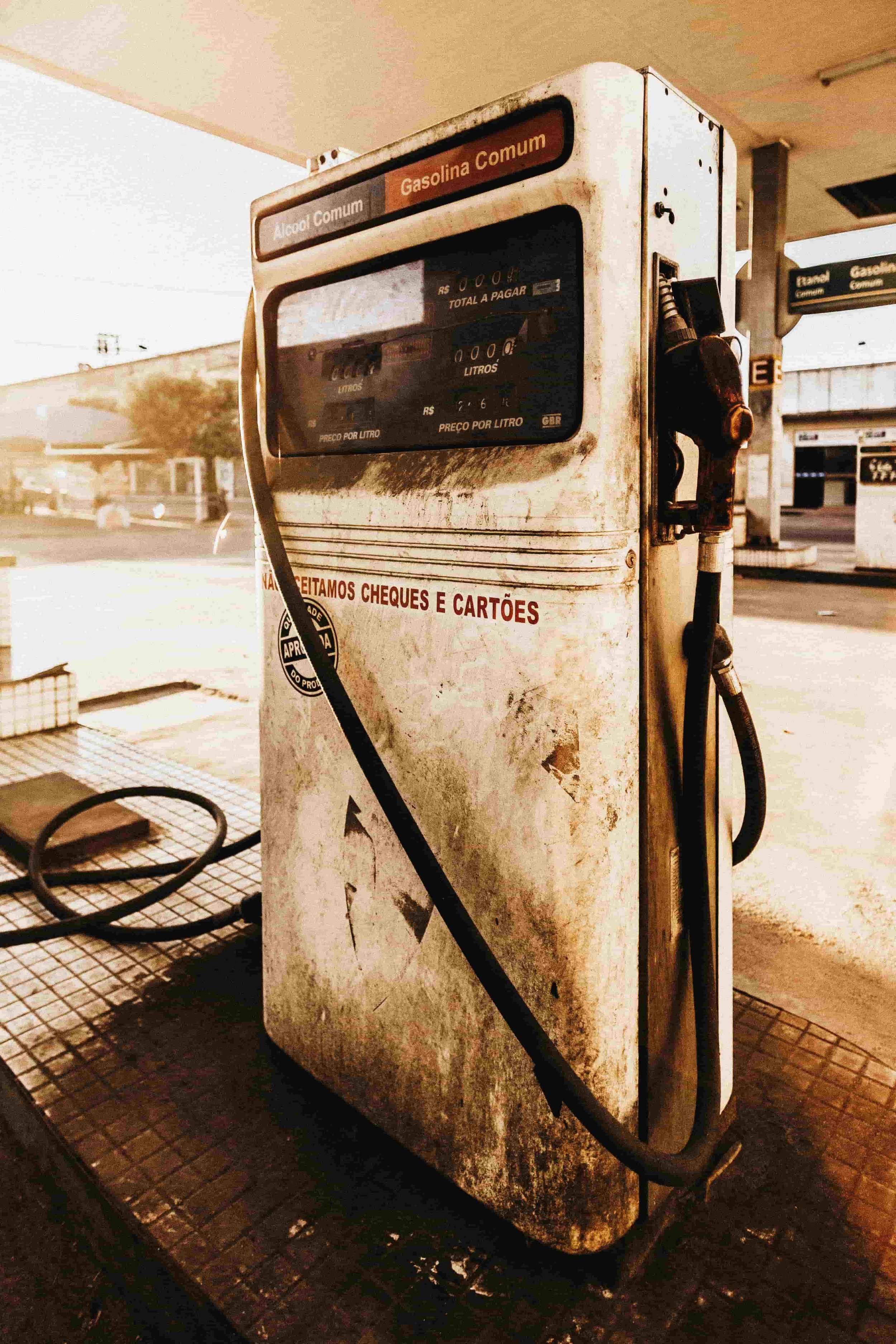
sources and further reading:
-
https://www.sciencedirect.com/topics/earth-and-planetary-sciences/strip-mining
-
https://www.dw.com/en/how-eco-friendly-are-electric-cars/a-19441437
-
http://theconversation.com/politically-charged-do-you-know-where-your-batteries-come-from-80886 <—— notice the study they use?
-
https://www.nationalobserver.com/2017/11/29/opinion/dont-be-fooled-attacks-lithium-battery
-
https://www.theverge.com/2018/6/21/17488626/elon-musk-cobalt-electric-vehicle-battery-science
-
https://www.wired.com/story/alternatives-to-cobalt-the-blood-diamond-of-batteries/
-
https://blog.grabcad.com/blog/2018/02/20/how-does-lithium-mining-work/
-
https://auto.howstuffworks.com/can-electric-car-batteries-be-recycled.htm


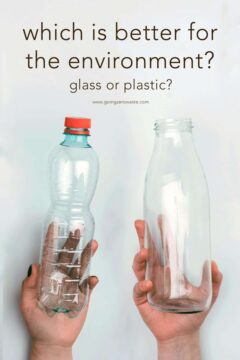




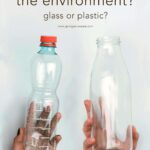



As always, a good blog post from you 🙂 I work within the electric vehicle charging industry, and I am infuriated by the way people use some of the arguments you mentioned in a way that suits their narrative but which leaves out most of the truth. I hear these arguments once a week, at least…
@balancedtoni
Thanks so much!
Wow, I’ve only just stumbled across this website today, this being the first article on here I’ve read, and I am delighted!
Really great article. I feel like I knew most of this stuff already deep down, or just had a general feeling that of course electric cars must be cleaner, but I didn’t quite know the specifics, so thank you for putting them all in one place!
Now I will be armed with some concise facts to back up my claims next time someone tries to argue that electric cars are no good because ‘the energy to charge them all comes from coal plants anyways’.
I’ve never quite had the facts to win those arguments, but now I do, so thank you very much! I look forward to reading this website from now on. Woooooo!
Cheers,
Adam Millett
wordchameleon.com
Thanks, Adam!
Good read !
Thanks!
I don’t know how, but every time I get the email update from your blog it’s EXACTLY the topics I’ve been thinking about for the week. I drive a Mini Cooper, my gift for my high school graduation, but I really planned on looking at the Hyundai Kona Electric for my next car. There hasn’t been a lot of research on my part yet since my car still has several years ahead of it, but I planned on making the switch. Also moving to a larger city (from Arkansas!) that I hope is a little more electric friendly then. I’ve heard all kinds of things like what you’ve mentioned, even so far as my friend (who actually works in the oil industry weirdly enough?) that electric car batteries are produced unethically and somehow that production harms waterways in the countries they’re made. Could you know what he means by this? I definitely agree with you, though. But I also haven’t deep dived into it just yet since it’s more of a 5 year plan.
And always, love your blog!
If you love your MINI they’re launching the first all-electric MINI next year. 😉 I’m sure he’s talking about the mining process. But, metals in gas-powered vehicles are also mined. It’s one of those, throwing the blame while neglecting the fact that all vehicles and tech use the same materials.
Synchronicity really is a thing – Skeptoid podcast was on EVs this week and agrees with you. Thanks for the new info.
What about the mining of the coal to provide electricity and the toxicity of the air when coal if burned ? and the fact that coal miners get trapped inside mines and die from poor working conditions world wide ? please address these concerns
This is great, thank you. Our car needs replacing and we’re doing research at the moment on EVs. We live in New Zealand where the Government has recently announced a subsidy scheme for EVs to try and encourage the uptake of them. There is limited choice here and the upfront cost is pretty large (beginning at $10,000NZD for the cheapest second-hand Nissan Leafs), BUT once you buy one it pays for itself – especially as petrol (gas) is a lot more expensive here than in the US. Also, we have 80% renewable energy. I’m excited to get one!
In short, the point is to do the least harm. If we make this our guiding principle, instead of demanding purity tests noone can meet, we might actually get shit done.
Absolutely elegant! A wonderful and powerful display of evidence – well done! We need voices like yours to continue the fight against industry-driven misinformation and fear. Great work!
We love our Tesla Model 3 which we power from our rooftop solar. It is the super fun to drive and great for road trips.
Electric cars are the way to go; but let’s not sugar coat it. What about the processes used to obtain lithium and cobalt? And the obscene percentage of NON-recycled lithium batteries? What are the plans for electricity production when the current few million electric vehicles on the road become a few hundred million? Solar farms and wind turbines are fine now, but what will the environmental impact be once coal, oil, and hydroelectric power are eliminated?
What a great article! I’m always so appreciative of your content, Kathryn. On the note about secondhand, I recently learned there’s also a small, but growing market for secondhand solar arrays. So, if you have wanted to install or use solar energy but are looking for less expensive options, that is one of many routes you could take! The only other recommendation I’ll add is for folks to check out the book, Car Country: An Environmental History, by Christopher W. Wells. Wells does a fantastic job helping his reader understand the rise of cars and how they changed our cities and rural spaces. He contrasts early cities and suburbs that were laid out on grids with the massive suburbanization after WWII which stopped following the grid. The book makes a powerful analysis of the relationship between cars, neighborhood walkability, and our environmental footprint.